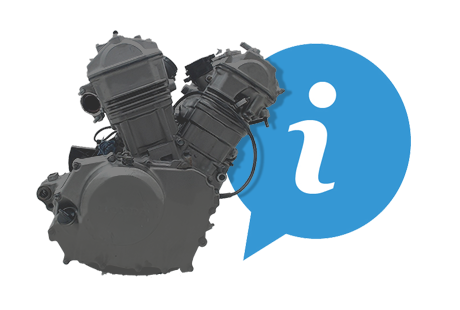What influence does the ignition voltage have?
In a CDI (capacitive discharge ignition), the spark plug receives its energy from the ignition capacitor charged to high voltage, which is built into the CDI:
E = 0,5 * C * Ui² (E: energy, C: capacity, Ui: ignition voltage)
The double voltage thus supplies four times the energy. After each ignition, the capacitor must be recharged - the higher the speed, the more often. The average electrical power emitted by the ignition sparks is the following:
P = RPM * C * Ui² / 120 (RPM: crankshaft speed / minute)
At 10.000 RPM, 1.5 µF and 150 V this is approx. 3 W, at 250 V approx. 8 W. A current of approx. 0.26 A or 0.73 A is drawn from the on-board power supply (14 V voltage) if losses of 30% are taken into account.
A higher ignition voltage provides for a more reliable combustion of the mixture, especially if the ignition system has deficiencies (too large electrode distance of the spark plug, plug connector or ignition cable faults). On the other hand, candle wear is higher and if the voltage is too high, the ignition coil may be damaged and the tachometer may malfunction.
What influence does the ignition map have?
The ignition angles specified in the ignition map have a direct influence on the torque and power of the engine. The influence can be described as axes in a diagram with ignition angle and torque. By further reducing the angle and thus the delay, the torque increases, reaches a maximum and then falls again. But be careful, premature ignitions can cause the engine to knock. The main goal is finding the optimum or getting as close to it as possible.
Other criteria also play a role when adjusting the ignition angle. For instance, vibrations and noise can greatly increase with premature ignitions, which can become unpleasant.
What influence does the fuel have?
Many older vehicles are low-compressed and designed for fuels that have not been available at the filling stations since around 2010. Normal fuel has a knock resistance of 91 octane, super petrol 95 octane and super plus is 98 octane. A fuel with a higher octane rating allows more advanced ignition, which allows a higher torque. This flexibility can be exploited to increase the torque. Check the intended fuel for your vehicle in the manual or ask your manufacturer.
What is engine knocking?
 Knocking produces a second, uncontrolled flame front which spreads at a much higher speed in the combustion chamber. The knock threshold and strength depends on the fuel, engine temperature, air intake, compression and combustion chamber geometry. At low speeds and light knocking, the result is usually only an unpleasant noise. Strong knocking can damage the engine mechanically and thermally. Knocking can also occur in high-frequency vibrations that cannot be perceived by the human ear.
Knocking produces a second, uncontrolled flame front which spreads at a much higher speed in the combustion chamber. The knock threshold and strength depends on the fuel, engine temperature, air intake, compression and combustion chamber geometry. At low speeds and light knocking, the result is usually only an unpleasant noise. Strong knocking can damage the engine mechanically and thermally. Knocking can also occur in high-frequency vibrations that cannot be perceived by the human ear.

